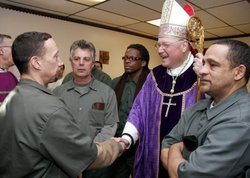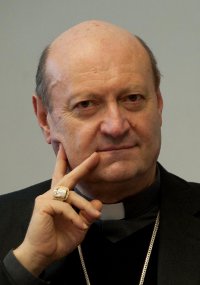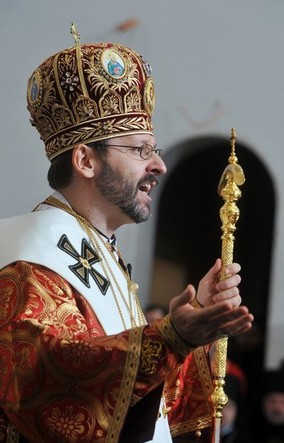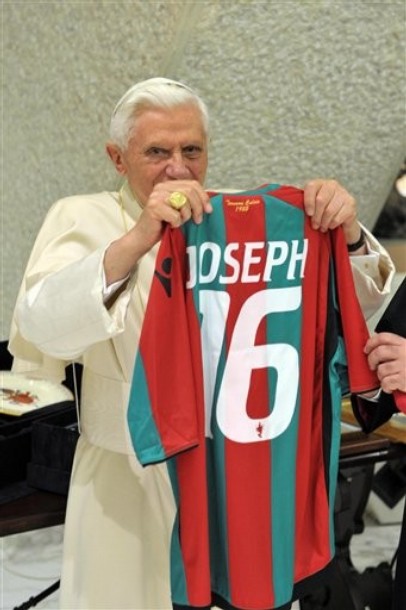 “all of us are sinners. We need mercy and healing that only Jesus can give,” Archbishop Timothy M. Dolan told prisoners today at the Arthur Kill correctional facility on Staten Island, NY. The Archbishop offered the Sacrifice of the Mass for about 75 prisoners and others. The story is here.
“all of us are sinners. We need mercy and healing that only Jesus can give,” Archbishop Timothy M. Dolan told prisoners today at the Arthur Kill correctional facility on Staten Island, NY. The Archbishop offered the Sacrifice of the Mass for about 75 prisoners and others. The story is here.
Is the Pope’s Irish proposal reasonable?
Haven’t been thinking of the Pope’s letter to the Church in Ireland regarding the sexual abuse problems in a while? Let’s start thinking anew: the year of prayer that the Pope asked for is coming to an with Easter. I’d like to know what’s different.
Reaching Muslims: A one-stop guide for Christians
about life and faith.” There is a lot of useful information given here: he covers lots of ground: politics, sociology, belief, justice matters, history and demographics.
Continue reading Reaching Muslims: A one-stop guide for Christians
Saint Stephen Harding
Today the Church –though localized to the Cistercian Order– celebrates the liturgical memorial of Saint Stephen Harding, one of the 3 founders of the Cistercian reform of Benedictine monastic life. Most of the faithful would not know of Saint Stephen unless they had contact with the Cistercians or remember their church history class.
Several things distinguish Saint Stephen Harding: he was English, he was the third abbot of Cîteaux, he was a man of great pragmatism, he was the author of the Charter of Charity (the foundational document of the Cistercian life), and was responsible for the liturgical formulations for this way of life, cleaning up the corruptions inserted into the Divine Office over the years.
On Saint Stephen’s deathbed he said, I assure you that I go to God in fear and trembling. If my baseness should be found to have ever done any good, even in this I fear, lest I should not have preserved that grace with the humility and care I ought.
For more on Saint Stephen Harding read this entry and this one.
Give beauty back to God, beauty’s self and beauty’s giver
A striking line
in Gerard Manley Hopkins’ poem “The Leaden Echo and the Golden Echo,” “Give
beauty back, beauty, beauty, beauty, back to God, beauty’s self and beauty’s
giver.” English Jesuit priest Gerard Manley Hopkins
(1844-1889) was renowned for his use of Blessed John Duns Scotus’ theology
and his creative use of language and rhythm (notice Hopkins’ characteristic
stresses on certain words).
The Leaden Echo and the Golden Echo
(Maiden’s song
from St. Winefred’s Well)
The Leaden Echo
How to kéep–is there ány any, is
there none such, nowhere known some, bow or
brooch or braid or brace, láce,
latch or catch or key to keep
Back beauty, keep it, beauty, beauty, beauty, …
from vanishing away?
Ó is there no frowning of these wrinkles, rankéd wrinkles
deep,
Dówn? no waving off of these most mournful messengers, still
messengers,
sad and stealing messengers of grey?
No there ‘s none, there ‘s none, O no
there ‘s none,
Nor can you long be, what you now are, called fair,
Do what you
may do, what, do what you may,
And wisdom is early to despair:
Be beginning;
since, no, nothing can be done
To keep at bay
Age and age’s evils, hoar
hair,
Ruck and wrinkle, drooping, dying, death’s worst, winding sheets, tombs
and worms and
tumbling to decay;
So be beginning, be beginning to despair.
O
there ‘s none; no no no there ‘s none:
Be beginning to despair, to
despair,
Despair, despair, despair, despair.
Continue reading Give beauty back to God, beauty’s self and beauty’s giver
We remain images of Christ, no matter what happens…
A perplexing issue of one’s faith is accepting that no matter what we do, no matter who we become, we remain a son or daughter of God. There is no unforgivable sin except the sin of presumption against the Holy Spirit. We can do the most heinous of things, even deny God’s existence, we remain in Christ’s reach for mercy in His washing us with His own Precious Blood. History has several good examples of people doing terrible things to others and destabilizing society, but is it impossible to have mercy on these people? The question eventually becomes: Can a person who does evil things be forgiven and saved? Is forgiveness outside the realm of possibility for God, for us? If not for God, why is it that we find so difficult to be merciful toward others?
God’s glory (Rom 3:23) so that all of us are at some time in our lives
potentially (and unfortunately all too actually) capable of real evil. Yet no
matter how depraved people may become, they remain always images of Christ the
true Image of God. That image-quality may be soiled, tarnished, obscured and
disfigured, but is never wholly lost, never totally destroyed.
commit sin the more we weave a web around ourselves, voluntarily blocking out
his light. That is why in the incarnation God punched a hole in our self-woven
cocoon and thrust in a hand to drag us out: that is why Christ descended into
our hell of God-forsakeness – so that we could not go on pretending to
ourselves – and in that way justifying our own ghastliness to ourselves and
others.
Sviatoslav Shevchuck: TODAY put the honest & True Cross in the center of life
His Beatitude, Archbishop Sviatoslav’s first homily as head of the Ukrainian Greek Catholic Church is noted below. It is a very good homily focusing on the Cross and our acceptance of that life-giving Cross today. We have no other option as Christians. Pay close attention to what the new archbishop says: live, witness, strive for holiness, move closer to Christ today.
Beloved in
Christ, brothers and sisters!
Glory to Jesus Christ!
“We praise your Cross,
Lord, and glorify Your holy resurrection!”
With these words today, the Church
of Christ focuses on the Honest and True Cross. Today, as we pass the halfway
point of our Lenten journey, the Life-Giving Tree is given to us, that we might
find in it a source of strength and courage to go on to the Resurrection, to
put the Sign of the Cross at the center of our lives.
In his Epistle to the
Philippians, St Paul has left us a unique early Christian hymn that a young
Church, newly enlivened by the Holy Spirit, solemnly sang in its Liturgy.
The
Apostle calls to us this way:
Have among yourselves the same attitude that is
also yours in Christ Jesus, Who, though he was in the form of God, did not
regard equality with God, something to be grasped. Rather, he emptied himself,
taking the form of a slave, coming in human likeness; and found human in
appearance, he humbled himself, becoming obedient to death, even death on a
cross. Because of this, God greatly exalted him and bestowed on him the name
that is above every name, that at the name of Jesus every knee should bend, of
those in heaven and on earth and under the earth, and every tongue confess that
Jesus Christ is Lord, to the glory of God the Father (2:6-11).
Continue reading Sviatoslav Shevchuck: TODAY put the honest & True Cross in the center of life
You, Lord, have shown every mercy
Pope’s team shirt
Court of the Gentiles –Le Parvis des Gentils à Paris: a call to fraternity to believers and nonbelievers to live coherent in Christ, and for a new humanity
 Cardinal Gianfranco Ravasi’s interview on the importance of the Court of the Gentiles for us. This is probably the single most significant initiative of the Pontifical Council for Culture taking seriously the place of belief and unbelief. The Pope some time ago asked the pastors of the Church to take atheism as a serious matter to engage in. And by atheism he’s not suggesting the Christopher Hitchens’ version of atheism but what might be called “honest atheism,” those who ask sincere questions of belief and who are seeking to live a coherent life. The Pope is brilliant in his call to respect, dialogue and living.
Cardinal Gianfranco Ravasi’s interview on the importance of the Court of the Gentiles for us. This is probably the single most significant initiative of the Pontifical Council for Culture taking seriously the place of belief and unbelief. The Pope some time ago asked the pastors of the Church to take atheism as a serious matter to engage in. And by atheism he’s not suggesting the Christopher Hitchens’ version of atheism but what might be called “honest atheism,” those who ask sincere questions of belief and who are seeking to live a coherent life. The Pope is brilliant in his call to respect, dialogue and living. I know that at the invitation of Cardinal André Vingt-Trois, the Archbishop of Paris, and of Cardinal Gianfranco Ravasi (seen right), the President of the Pontifical Council for Culture, you are gathered in great numbers in front of the Cathedral of Notre Dame in Paris. I greet all of you, together with our brothers and friends from the Taizé Community. I am grateful to the Pontifical Council for having taken up and extended my invitation to open a number of “Courts of the Gentiles” within the Church. This image refers to the vast open space near the Temple of Jerusalem where all those who did not share the faith of Israel could approach the Temple and ask questions about religion. There they could meet the scribes, speak of faith and even pray to the unknown God. The Court was then an area of separation, since Gentiles did not have the right to enter the consecrated area, yet Jesus Christ came to “break down the dividing wall” between Jews and Gentiles, and to “reconcile both to God in one body through the cross, thus putting to death that hostility in himself”. In the words of Saint Paul, “He came and proclaimed peace…” (cf. Eph 2:14-17).
I know that at the invitation of Cardinal André Vingt-Trois, the Archbishop of Paris, and of Cardinal Gianfranco Ravasi (seen right), the President of the Pontifical Council for Culture, you are gathered in great numbers in front of the Cathedral of Notre Dame in Paris. I greet all of you, together with our brothers and friends from the Taizé Community. I am grateful to the Pontifical Council for having taken up and extended my invitation to open a number of “Courts of the Gentiles” within the Church. This image refers to the vast open space near the Temple of Jerusalem where all those who did not share the faith of Israel could approach the Temple and ask questions about religion. There they could meet the scribes, speak of faith and even pray to the unknown God. The Court was then an area of separation, since Gentiles did not have the right to enter the consecrated area, yet Jesus Christ came to “break down the dividing wall” between Jews and Gentiles, and to “reconcile both to God in one body through the cross, thus putting to death that hostility in himself”. In the words of Saint Paul, “He came and proclaimed peace…” (cf. Eph 2:14-17).




